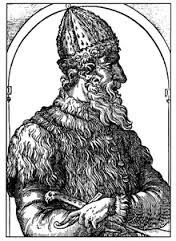One of the main protagonists of my new historical fiction book, Red Corner, An Alternate History of Rus, A Novel, is Ivan III Vasilyevich (Russian: Иван III Васильевич) (1440, Moscow – 1505, Moscow), also known as Ivan the Great, Grand Prince of Muscovy and Grand Prince of all Rus (Великий князь всея Руси). In history he is known as “gatherer of the Russian lands”, as he extended Muscovy’s influence and power base by more than three times what it had been during his lifetime. Among other things he put pay to the Golden Hordes 250-odd years of dominance in Rus.
Ivan Vasiilyevich’s war with the Republic of Novgorod – starting in 1470 – is the main focus of my novel. The city-state was uncomfortable with Muscovy’s growing power. Novgorod – in retaliation – had schemed with Lithuania, hoping to find protection from the Polish king, Casimir IV, King of Poland and Grand Prince of Lithuania. Ivan fought against Novgorod in 1471, and after twice defeating the armies of the republic—at the Battle of Shelon River and on the North Dvina, both in the summer of the same year—the Novgorodians sued for peace. The outcome was a loss of Novgorod’s political autonomy and eventual annexation by Muscovy.
The dream of a democratic Russia was over. And the rest is history, so they say.
In my novel, however, history stops there – Ivan Vasilyevich is actually defeated by Dmitry Boretsky of Novgorod, the Mayoress Marta Boretskaya’s oldest son, at the Battle of Shelon River, which turns the tide in the land of the Rus. The novel follows on from these events, and in particular showing the mindset of Ivan Vasilyevich within this hypothetical crisis and all that it entailed.
As already mentioned, time and events have given Ivan III a place in the historical pantheon of great Russian leaders, yet in Red Corner, this man’s path goes in a very different direction.

Ivan III on the “Millennium of Russia” monument in Veliky Novgorod
The historical figure of Ivan Vasilyevich and everything he did after 1471 is superseded by alternate events which begin to play on his mind, embroiling him and his psyche into areas he finds hard to deal with. With the weight of defeat on his shoulders, he falls ever deeper into madness and depression. What comes of it? If you wish to find out the conclusion, you’ll need to read the book. Details of the links are in my previous post.
